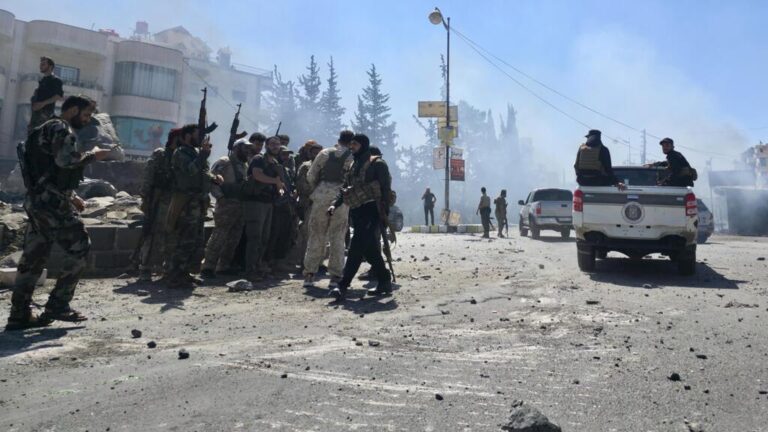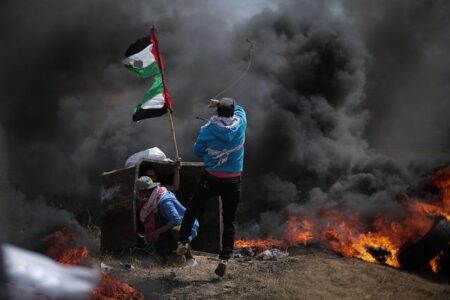In a sharp denunciation of escalating violence in Syria, the French government has strongly condemned the reported atrocities committed against civilians in the southwestern province of Sweida. According to reports, recent actions by armed groups have resulted in civilian casualties and widespread fear among the local population. This condemnation underscores France’s ongoing commitment to human rights and its stance against the brutal tactics employed in the Syrian conflict. The French Foreign Ministry’s statement calls for immediate accountability and an urgent humanitarian response, reflecting the international community’s growing concern over the deteriorating situation in the region. As the conflict drags into its thirteenth year, the plight of innocent civilians in Syria remains an alarming issue that demands global attention and action.
France’s Strong Rejection of Violence Against Civilians in Sweida
France has explicitly denounced the recent reports of violence targeting civilians in Sweida, Syria, condemning the acts as gross violations of human rights and international law. French officials emphasized the need for accountability, urging that those responsible for such atrocities must be brought to justice. The situation in Sweida has escalated tensions within the region, with increasing concerns over the safety and welfare of vulnerable populations caught in the crossfire of ongoing conflicts.
In a statement, the French government highlighted its unwavering commitment to humanitarian principles, insisting that civilian lives must be protected. Key points raised include:
- Immediate Ceasefire: An urgent call for all parties to halt hostilities and protect civilians.
- Humanitarian Access: A demand for unimpeded access for humanitarian organizations to provide aid.
- International Oversight: Support for international mechanisms to monitor and report on the situation to prevent further atrocities.
| Key Concerns | French Response |
|---|---|
| Reports of civilian casualties | Condemnation and calls for accountability |
| Access to humanitarian aid | Pressure for unrestricted support |
| Violence escalation | Demand for a ceasefire |
The Humanitarian Crisis Unfolding: A Closer Look at Sweida’s Atrocities
The recent surge in violence in Syria’s Sweida province has drawn widespread condemnation from international leaders, particularly from France, which has called for immediate action to protect civilians amidst the escalating humanitarian crisis. Reports of systematic atrocitiesŌĆöincluding targeted attacks on unarmed populations, forced displacements, and food shortagesŌĆöpaint a grim picture of the situation on the ground. The violence, largely attributed to local militia groups, has left many residents trapped within escalating hostilities, leading to growing fears for their safety and survival.
As humanitarian organizations scramble to provide aid to those affected, the need for urgent intervention is more pressing than ever. Key issues that have been highlighted include:
- Escalation of Armed Conflict: Increased clashes between various factions intensify the threat to civilian lives.
- Mass Displacement: Thousands of families have been forced to flee their homes, exacerbating the refugee crisis in neighboring regions.
- Access to Essential Resources: Many in Sweida face severe shortages of food, medical supplies, and clean water.
To better understand the gravity of the situation, the following table outlines some of the key statistics reflecting the crisis:
| Category | Statistics |
|---|---|
| Displaced Families | Over 50,000 |
| Casualties Reported | Approximately 1,200 |
| Aid Assistance Provided | Less than 30% of those in need |
International Responsibility: Calls for Accountability and Action
The recent condemnation from France regarding the reported atrocities against civilians in SyriaŌĆÖs Sweida has sparked a renewed discussion on global responsibility. This reaction highlights the ongoing humanitarian crises faced by innocent populations caught in the crossfire of prolonged conflicts. FranceŌĆÖs call for accountability not only seeks justice for the victims but also emphasizes the urgent need for the international community to take decisive action against such violations. Reports indicate widespread suffering, including:
- Targeted attacks on civilian populations
- Displacement of families from their homes
- Access to basic necessities being obstructed
In light of these developments, countries are urged to collaborate more effectively to ensure that those responsible for these heinous acts are held accountable. Several organizations are pushing for the establishment of international tribunals and other mechanisms for justice. As discussions unfold, a crucial aspect of this debate is the need for sustained humanitarian aid and support for affected communities. The following table summarizes key international responses to the situation:
| Country/Organization | Response |
|---|---|
| France | Condemnation of atrocities and demand for accountability |
| United Nations | Call for humanitarian access and protection of civilians |
| Human Rights Watch | Report documentation and push for sanctions |
Collaborative Efforts Needed: Recommendations for Global Intervention and Support
In light of the recent atrocities reported in Sweida, the international community must take decisive action to address the ongoing humanitarian crisis facing civilians in Syria. Collaborative efforts among nations, NGOs, and humanitarian organizations are essential for establishing a robust framework to deliver aid and ensure the safety of vulnerable populations. Key recommendations include:
- Increased Diplomatic Pressure: Nations must unite in urging the Syrian government and all involved parties to commit to ceasefire agreements.
- Humanitarian Corridors: Secure and monitored pathways should be established to allow safe passage for aid deliveries and evacuations.
- International Investigations: Independent bodies must be mandated to investigate reported atrocities and hold perpetrators accountable.
Furthermore, coordinated efforts should leverage technology and data to enhance monitoring of the situation on the ground. Governments are encouraged to share intelligence and resources to form a comprehensive response strategy aimed at alleviating the suffering of those affected. A potential framework could involve:
| Action | Responsibility | Expected Outcome |
|---|---|---|
| Implement Sanctions | UN & EU | Pressure on regime |
| Host International Aid Summit | Global Leaders | Increased funding |
| Create Task Force | NGOs | Enhanced support networks |
To Wrap It Up
In conclusion, France’s condemnation of the reported atrocities against civilians in Syria’s Sweida highlights the ongoing humanitarian crisis in the region and reinforces the need for the international community to take decisive action. As the situation continues to escalate, the voices of those suffering must not be silenced. The French government reiterates its call for accountability and urges all parties involved to prioritize the protection of civilians. As global attention turns to the plight of the Syrian people, it remains imperative that diplomatic efforts are strengthened to restore peace and stability in the war-torn nation. The world must watch closely as these developments unfold, holding accountable those responsible for the ongoing violence and ensuring that humanitarian aid reaches those in desperate need.




